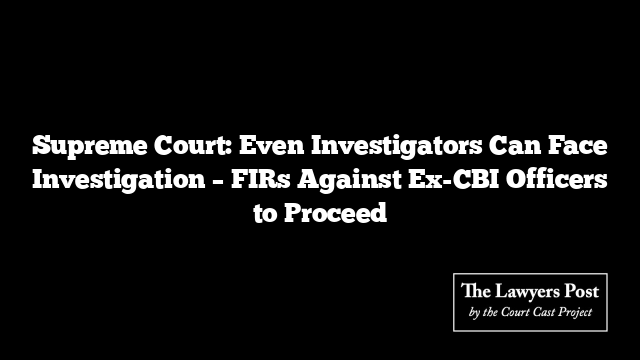The country’s top court has sent out a sharp reminder: the shield of authority cannot block the reach of accountability. The Supreme Court has upheld orders for FIRs to be registered against former Delhi Police Commissioner Neeraj Kumar and Inspector Vinod Kumar Pandey, both of whom were serving on deputation with the CBI when serious allegations surfaced more than two decades ago.
A bench of Justices Pankaj Mithal and Prasanna B. Varale dismissed their challenges to Delhi High Court rulings that had revived complaints dating back to 2000. The accusations are weighty—intimidation, forgery, and manipulation of records—charges that cut at the very foundation of the justice system.
“It would be a grave contradiction if such offences went uninvestigated, especially when committed by those meant to investigate others,” the Court remarked. “Justice must not only be done but be seen to be done. Sometimes those who investigate must also be investigated.”
The complaints came from two men. Vijay Aggarwal accused the officers of coercion and abuse to force withdrawal of a case against Kumar, while Sheesh Ram Saini alleged irregular seizures of documents and misuse of authority. The IPC provisions invoked against the duo range from criminal intimidation and wrongful confinement to forgery and criminal conspiracy.
Back in 2006, a Single Judge of the High Court had directed FIR registration after finding that the allegations revealed prima facie cognizable offences. The CBI’s preliminary inquiry had claimed otherwise, but the High Court rejected its findings and insisted that the matter be probed independently.
The officers fought back for years, arguing that their actions were part of official duty, that no cognizable offences were made out, and that the High Court had exceeded its jurisdiction. But the Supreme Court was unpersuaded. It noted that a preliminary inquiry cannot shield accused officers if the complaints themselves disclose serious offences.
Importantly, the Court modified one aspect: instead of the Special Cell (which normally handles terrorism cases), the investigation will now be led by a Delhi Police officer of at least ACP rank. The CBI’s earlier inquiry may be considered but will not bind the investigation.
Directing that the probe be wrapped up swiftly—preferably within three months—the Court made clear that Kumar and Pandey must cooperate fully. Registration of FIRs, it added, does not prejudice the officers since they will have the opportunity to contest closure reports or chargesheets through due process.
With this ruling, the Supreme Court underscored a simple but powerful principle: no investigator is above the law, and accountability must reach even those who once carried the badge of authority.





